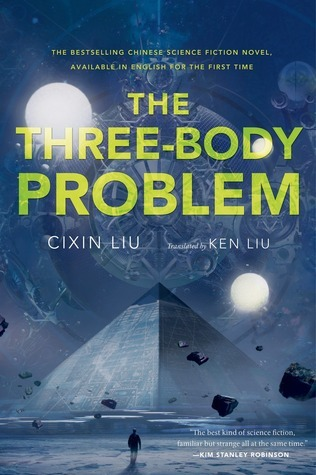Having finally turned the (audiobook's) last page of Cixin Liu's "The Three-Body Problem," the sheer scope and audacity of the narrative continue to resonate. This first contact scenario unfolds with an almost immediate and unsettling impact, delivering an experience unlike anything I've encountered before in Science Fiction.
While some science fiction epics feel like sprawling journeys through familiar tropes, Cixin Liu's work throws you headfirst into a crisis that blends scientific mystery with profound philosophical implications. There's a distinct sense of wonder here, but it's tinged with a creeping dread, a feeling that humanity is grappling with forces far beyond its comprehension.
Cixin Liu;s "The Three-Body Problem" is an intellectual gauntlet, challenging our assumptions about physics, society, and our place in the cosmos. The narrative weaves together seemingly disparate threads: the suicide of a brilliant physicist during China's Cultural Revolution, a clandestine online game called "Three Body," and strange anomalies in scientific research. These threads gradually converge, revealing a terrifying truth about the universe and humanity's potential future within it.
What truly distinguishes this book is its unflinching portrayal of alien intelligence and the potential consequences of interstellar contact. The extraterrestrial civilisation at the heart of the story, are not romanticised beings with benevolent intentions. Instead, they are a species hardened by a brutal and unpredictable environment, their logic and motivations utterly alien to human sensibilities. This stark contrast forces a brutal examination of human nature, our inherent limitations, and our capacity for both ingenuity and self-destruction when faced with an existential threat.
The concept of the "Sophon," a weaponised particle that can interfere with scientific progress and monitor humanity on a subatomic level, is particularly chilling and ingenious. It underscores the immense technological disparity between the two civilisations and highlights humanity's vulnerability in the face of a more advanced adversary. Here, the encounter feels less like a dialogue and more like a looming threat.
While some science fiction prioritises individual character arcs against a backdrop of cosmic mystery, "The Three-Body Problem" often focuses on the unfolding scientific and political crisis. However, the characters, particularly Wang Miao and Shi Qiang, serve as crucial anchors, providing human perspectives on the unfolding events. Their struggles to understand and confront the impossible create a compelling narrative drive.
The Eastern perspective of the Chinese author, while offering a refreshing departure from much of Western science fiction, can at times lead to prose that feels somewhat less direct or conventional for Western readers such as myself. Certain passages require a more patient and perhaps meditative approach, inviting reflection rather than immediately apparent meaning. However, this unique lens ultimately enriches the narrative, offering different cultural and philosophical viewpoints on humanity's predicament.
Throughout the book, there's a pervasive sense of scientific realism, even amidst the most mind-bending concepts. Cixin Liu grounds his speculative ideas in established physics before venturing into the truly extraordinary. This lends a weight and credibility to the narrative, making the outlandish feel strangely plausible.
As the story progresses, the revelations about the alien threat and their intentions become increasingly alarming. The concept of the "Dark Forest" theory, introduced within the narrative, offers a bleak and thought-provoking perspective on interstellar relations, suggesting that silence and concealment are the only means of survival in a cosmos teeming with potential threats. This perspective carries a weight of philosophical contemplation that resonates deeply.
What lingers after finishing "The Three-Body Problem" is a profound sense of unease and a re-evaluation of humanity's cosmic significance. The book doesn't offer easy answers or comforting resolutions. Instead, it presents a stark and challenging vision of our place in a potentially hostile universe. The at times demanding prose ultimately contributes to this reflective experience, inviting a deeper engagement with the novel's core ideas.
While the narrative can be dense at times, particularly in its exposition of scientific concepts and historical context, the sheer originality and intellectual firepower of "The Three-Body Problem" make it a compelling and unforgettable read. It demands engagement and rewards the reader with a truly unique and thought-provoking science fiction experience, enriched by its distinct cultural perspective.
"The Three-Body Problem" feels like the opening salvo in a much larger and potentially devastating conflict. It leaves you with a sense of anticipation and dread for what might come next, coupled with a lingering sense of philosophical inquiry. And, it is indeed, with there being a few subsequent novels following up the story. I'm going to get through them.
For those seeking a science fiction novel that pushes boundaries, challenges assumptions, and offers a truly alien perspective, "The Three-Body Problem" is an absolute must-read. Prepare to have your understanding of the universe, and humanity's place within it, profoundly shaken, and be prepared to engage with a narrative that unfolds with a unique and ultimately rewarding rhythm.
I'm ignoring the fact that there's a TV series. I will not be watching it, I don't need to, the book was incredible.
